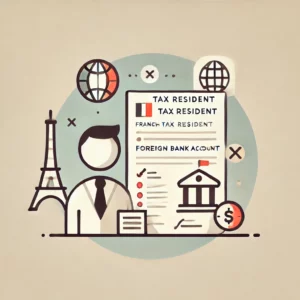
Tax optimization through a foreign subsidiary
One option for reducing the tax burden is to set up a subsidiary in a foreign country. A foreign subsidiary of a French parent company is considered a separate tax entity and is therefore not taxed in France, but rather subject to the tax laws of the country where it is located. By setting up a subsidiary in a foreign country, it is possible to benefit from more favorable tax treatment than in France. Once the subsidiary has been subject to the tax rules of the foreign country and has made a profit, it can pay dividends to its parent

Capital Gains Tax in France – How should I expect it to be treated?
When purchasing an asset that is expected to appreciate in value, it is crucial to consider the capital gains tax in France. Understanding how your gains will be taxed when you decide to sell your investments is essential, in order not to face important financial issues. Like most countries, France imposes a capital gains tax (CGT) on the disposal of assets that result in a monetary gain. However, not all gains are subject to the same tax treatment. The taxation of movable/intangible assets, such as shares and bonds, differs significantly from that of immovable/tangible assets, such as property. How are

I have foreign bank accounts and I am a french tax resident, what tax obligations to complete ?
I have foreign bank accounts – How am I supposed to declare it regarding French law in 2023? First of all it is important to get in mind that It is perfectly legal to open an account abroad. However, it is essential to declare it to the French tax authorities if you are a French tax resident. You must declare your accounts with your annual tax return using specific forms. If the mentioned account generates income, you will also need to complete other specific forms in addition. It is important to specify that tax authorities of other countries regularly send

I am a non-resident, I have real estate in France and abroad, do I need to pay the property wealth tax (IFI)?
As a non-resident owning property in France and/or abroad, you may be wondering whether you are liable for property wealth tax (impôt sur la fortune immobilière – IFI). The IFI applies only to persons who, on January 1st of the year, own net taxable property worth more than €1.3 million. These individuals are then required to file an IFI tax return the following year (N+1). This condition is verified for the assets held by all members of the tax household, including the taxpayer, spouse, civil partner (PACS) cohabitee and minor children for whom the persons mentioned have legal administration of

Impatriate tax regime : Basics and essentials to know
Basic principles of the tax regime for impatriates in France Impariate tax regime in France is considered to be one of the most attractive in Europe due to its multiple advantages. If you are an impatriate or thinking of becoming one, here are the essential points to know. The preferential tax regime for impatriates Definition: Implemented in France in 2004, the impatriation tax regime allows individuals who have recently settled in France to benefit from favorable income tax treatment. This scheme is aimed at individuals who were domiciled outside France for tax purposes during the five years prior to taking

What tax do I have to pay in France as a non resident?
What taxes do foreign nationals have to pay in France? Taxes payable in France by a foreign national, whether European or of another nationality, depend on certain specific situations. Here is an overview of the main applicable taxes: income tax, council tax , property tax and property wealth tax. Income tax What income is concerned? Certain incomes are considered as French-source incomes if it is generated by an activity carried out in France. The following types of income fall into this category: – Salaries – Daily social security benefits (sickness, maternity, etc.) – Unemployment benefit – Income from self-employed activities

French tax resident : A focus on criteria
French tax residence: the 183-day rule The 183-day rule is a commonly used criterion for determining French tax residence. A person’s taxresidence has an impact on their taxation regime in terms of income tax, inheritance tax, gift tax andproperty wealth tax. To define this concept, it is essential to understand the criteria set out in article4A of the French General Tax Code. According to these criteria, a person is considered to be resident in France for tax purposes if he orshe meets one of the following criteria: Having a home in France, or failing that, have a principal place of